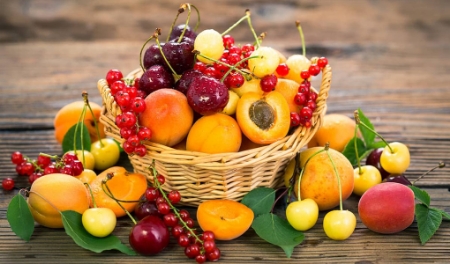Turkey is blessed with a diverse climate and rich soil, making it a haven for a wide range of fresh and delicious fruits. As you travel through the various regions of this transcontinental nation, you'll discover an abundance of orchards bearing fruits that burst with flavor, many of which are at their prime depending on the season. Let's take a tour through the calendar and highlight some of the freshest and most luscious fruits Turkey has to offer throughout the year.
Spring (March - May)
1. Strawberries: Come spring, fields in Turkey start turning red with juicy strawberries. They're sweet, tangy, and often eaten fresh or turned into jams.
2. Green Almonds: Often consumed fresh with a slightly sour taste, these are a seasonal delight enjoyed with a sprinkle of salt.
3. Loquats (Medlar): This is the season when the loquat trees bear their sweet, tangy, and slightly acidic fruits. They're small, orange, and perfect for a sunny day snack.
Summer (June - August)
1. Cherries: Turkey is one of the world's leading producers of cherries. Come summer, these juicy and sweet delights are everywhere, from local markets to street-side stalls.
2. Apricots: Especially famous from the Malatya region, Turkish apricots are sweet, succulent, and often dried to be consumed all year round.
3. Figs: Fresh figs in Turkey are a treat! Soft, sweet, and pulpy, they're often enjoyed fresh, though dried figs are also a popular Turkish delicacy.
4. Peaches and Nectarines: These fuzzy and juicy fruits are summer staples, enjoyed fresh or as a part of summer desserts.
5. Melons and Watermelons: Summers in Turkey are incomplete without the refreshing taste of melons and watermelons, often served chilled to beat the heat.
Autumn (September - November)
1. Pomegranates: As autumn sets in, pomegranates start ripening. With their juicy red seeds, they're not only delicious but also packed with health benefits.
2. Grapes: Turkish vineyards are a sight to behold in autumn. Grapes, both for eating and winemaking, are harvested during this season.
3. Quinces: A bit tart when raw, quinces are often cooked or turned into jellies and jams in Turkish cuisine.
4. Persimmons: These bright orange fruits are sweet and slightly tangy, often eaten fresh or dried.
Winter (December - February)
1. Citrus (Oranges, Mandarins, and Grapefruits): Winters in Turkey see a surge in citrus production, especially in the Mediterranean regions.
2. Apples and Pears: While available almost all year round, they're especially crisp and juicy during the colder months.
As the seasons change, so does the fruit landscape in Turkey. Each time of the year offers its own palette of flavors, ensuring that there's always something fresh and delicious to look forward to. Whether you're planning a visit or simply indulging in Turkish produce at your local market, make sure to enjoy these fruits at their seasonal best!
Relishing the Summer
The sun-kissed shores of Turkey are not just about the azure waters of the Aegean and the Mediterranean. The summer months unveil a myriad of flavors and experiences, rooted deep in the rich soils and age-old traditions of this transcontinental gem. Let's immerse ourselves further into what the Turkish summer has to offer, beyond just the commonly known fruits.
Bountiful Harvests and Lush Orchards
Mulberries: Come summer, trees laden with black, red, and white mulberries paint a delightful picture across Turkish towns. Sweet and slightly tangy, they're often enjoyed right off the tree or turned into delicious syrups and jams.
Plums: Turkish summers see a variety of plums – from the sour green types, perfect for pickling, to the sweet, juicy red and black varieties.
From Farm to Table: Seasonal Dishes and Delicacies
Zeytinyağlı Yaprak Sarma (Stuffed Vine Leaves with Olive Oil): These are grape leaves stuffed with a mix of rice and spices, soaked in olive oil. Best enjoyed cold, they're a staple in Turkish summer picnics.
Ayran: This refreshing yogurt-based drink is Turkey's answer to the summer heat. Creamy yet watery, salty yet invigorating, it’s often paired with grilled meats.
Kısır: A cold bulgur salad seasoned with tomato paste, fresh tomatoes, herbs, and pomegranate molasses – an absolute summer delight!
Summer Festivals and Traditions
Cherry Festivals: The towns of Giresun and Karacabey, renowned for their cherries, host annual festivals celebrating the summer cherry harvest. Visitors can partake in cherry-picking, local music, dances, and of course, tasting sessions.
Lavender Harvest in Isparta: In July, the fields of Isparta turn a mesmerizing shade of purple. The annual lavender harvest is not just about the aromatic yield but also about the festivals, workshops, and tours that allow visitors to immerse in the experience.
Seaside Delicacies and Gastronomy
Grilled Fish: The warm summer evenings by the Turkish coast see a surge in al fresco dining. Fresh fish, straight from the sea, grilled to perfection and paired with mezes is a ritual for many.
Mezes: These are small dishes, often cold, ranging from hummus and tabbouleh to more unique summer specials like octopus salad or stuffed mussels.
Rakı-Balık: A cherished summer evening tradition, Rakı is an anise-flavored spirit, often paired with fish dishes (Balık). The combination, along with a spread of mezes and the ambient sounds of the sea, captures the essence of Turkish summer nights.
The Turkish summer is a sensory journey – from the taste of fresh produce and traditional dishes to the sights and sounds of festivals and the serene beaches. It's a season that resonates with vibrancy, flavors, and age-old traditions, making it a truly unforgettable experience.





Leave your comment